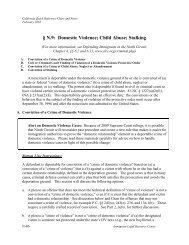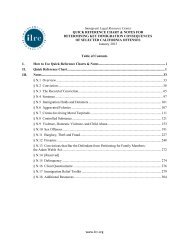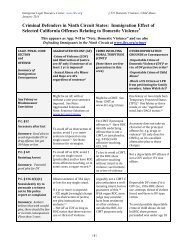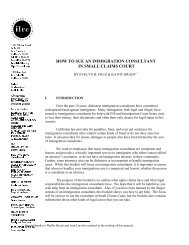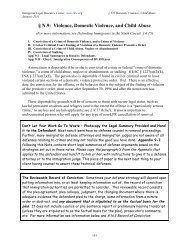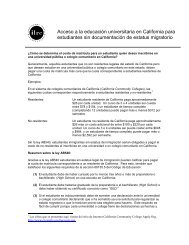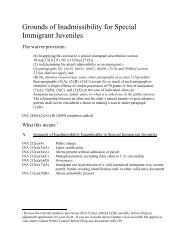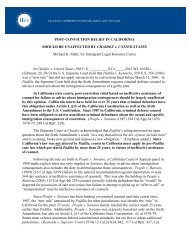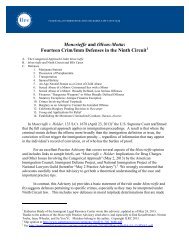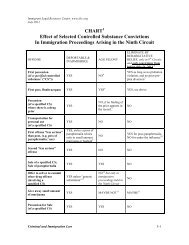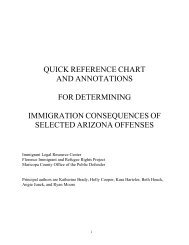Inspiring Leadership in Immigrant Communities - ILRC
Inspiring Leadership in Immigrant Communities - ILRC
Inspiring Leadership in Immigrant Communities - ILRC
- No tags were found...
Create successful ePaper yourself
Turn your PDF publications into a flip-book with our unique Google optimized e-Paper software.
7. Use the negotiat<strong>in</strong>g style that suits your personality.<strong>Inspir<strong>in</strong>g</strong> <strong>Leadership</strong> <strong>in</strong> <strong>Immigrant</strong> <strong>Communities</strong>January 2003Some people f<strong>in</strong>d it works best to be distant and formal when negotiat<strong>in</strong>g. Others like to be morefriendly and casual. Some people naturally use reason and others tend to be more threaten<strong>in</strong>g.With practice you will f<strong>in</strong>d what is most comfortable for you. The important th<strong>in</strong>gs to rememberare not to let the other side <strong>in</strong>timidate you, not to make the fight personal, bear <strong>in</strong> m<strong>in</strong>d what isright and, whenever you can, rely on what is right and the law.§ 7.5 Small Group Negotiation Exercise (70 m<strong>in</strong>utes)1. Introduction to Exercise (10 m<strong>in</strong>utes)Start by tell<strong>in</strong>g the participants that dur<strong>in</strong>g the next hour they will be practic<strong>in</strong>g negotiations witheach other. Then give them this brief <strong>in</strong>troduction to the exercise:a. There are many possible ways families, community members, neighbors, tenants,clients and others can be negotiators. Some of the th<strong>in</strong>gs we do to negotiate are writ<strong>in</strong>gletters, mak<strong>in</strong>g phone calls, meet<strong>in</strong>g with the an <strong>in</strong>stitution or person face-to-face andgo<strong>in</strong>g to community meet<strong>in</strong>gs to build community support to negotiate.b. This exercise will allow all of you to practice at a negotiation by hav<strong>in</strong>g a mockcommunity meet<strong>in</strong>g with the INS Border Patrol. The meet<strong>in</strong>g is really a groupnegotiation around an abuse of the rights of people. The Border Patrol has been stopp<strong>in</strong>gand question<strong>in</strong>g people on street corners near schools <strong>in</strong> San Jose, Calif., for the last fourweeks. Community members have compla<strong>in</strong>ed that several undocumented children werepicked up by the Border Patrol on the way home from school. The Border Patrol does nothave a history of conduct<strong>in</strong>g enforcement actions near schools and this makes theseevents <strong>in</strong> San Jose even more outrageous <strong>in</strong> the eyes of the community. The Border Patrolis concerned about gett<strong>in</strong>g a lot of negative publicity around this issue, especially becauseit has affected children and schools.c. Each of you will be assigned a role <strong>in</strong> the role-play. You’ll have about 20 m<strong>in</strong>utes toprepare for a negotiation. We will split <strong>in</strong>to small groups of about seven people for eachgroup. Two-three people <strong>in</strong> each group will play INS Border Patrol officials, and theothers will play community members outraged at the Border Patrol’s recent action.Everyone must make a presentation of at least two m<strong>in</strong>utes dur<strong>in</strong>g the negotiationexercise. The team of “community members” must determ<strong>in</strong>e the order and focus of eachperson’s presentation.Please Note: Tell the participants that even though the Border Patrol activity happenedover 500 miles from the border, it is based on a real Border Patrol action and the BorderPatrol has offices throughout many parts of the <strong>in</strong>terior of the United States, <strong>in</strong>clud<strong>in</strong>gnear San Jose, California.7-9



